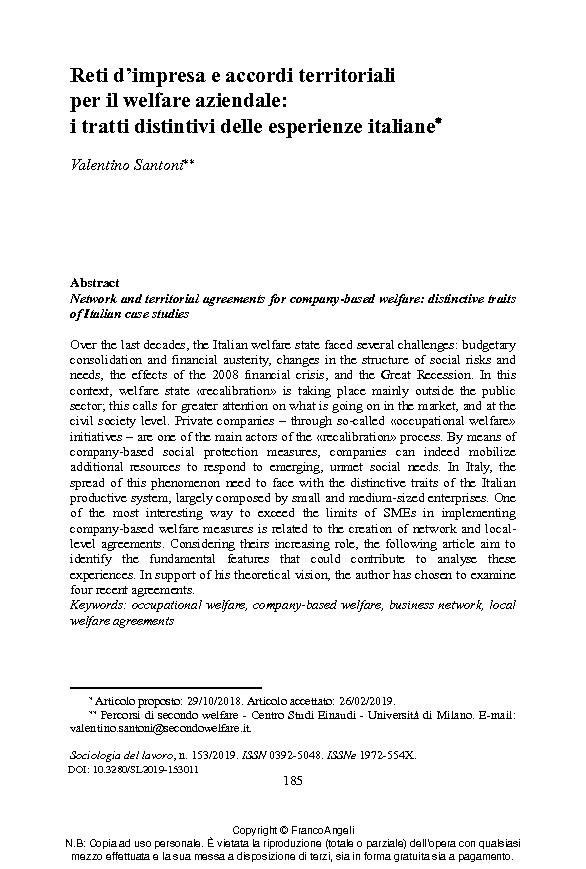Reti d'impresa e accordi territoriali per il welfare aziendale : i tratti distintivi delle esperienze italiane
185-201 p.
I cambiamenti nella struttura sociale e demografica del nostro Paese, l'emergere di nuovi rischi sociali e le conseguenze connesse alla recente crisi economica hanno profondamente cambiato il volto del sistema di welfare italiano. Negli ultimi anni, il sistema di protezione sociale pubblico è apparso in crescente difficoltà nel fornire risposte alle crescenti richieste provenienti dai cittadini. Di conseguenza, sono nate forme di intervento sociale che, mobilitando risorse economiche non pubbliche, hanno cercato di integrare e sostenere il welfare state. Tra queste vi sono le iniziative di welfare aziendale. Secondo recenti ricerche, la diffusione di tale fenomeno non sembra però progredire in maniera uniforme nel territorio del nostro Paese. Una delle strade più promettenti per superare questo limite può essere quella dell'aggregazione. Nell'ultimo periodo sono state molte le esperienze di imprese che - comprendendo le potenzialità del welfare aziendale -
hanno costituito reti di aziende e hanno preso parte a network multi-attore formati anche da soggetti del Terzo Settore e da istituzioni pubbliche. Sulla base di queste premesse, lo scopo del presente contributo è quello di individuare e approfondire le caratteristiche fondamentali che possono aiutare a descrivere in maniera sintetica le esperienze realizzate in Italia. Per far ciò, partendo proprio dall'osservazione di tali dinamiche, saranno analizzati alcuni network che si sono proposti di strutturare piani di welfare aziendale. [Testo dell'editore].
Over the last decades, the Italian welfare state faced several challenges: budgetary consolidation and financial austerity, changes in the structure of social risks and needs, the effects of the 2008 financial crisis, and the Great Recession. In this context, welfare state «recalibration» is taking place mainly outside the public sector; this calls for greater attention on what is going on in the market, and at the civil society level. Private companies - through so-called «occupational welfare» initiatives - are one of the main actors of the «recalibration» process. By means of company-based social protection measures, companies can indeed mobilize additional resources to respond to emerging, unmet social needs. In Italy, the spread of this phenomenon need to face with the distinctive traits of the Italian productive system, largely composed by small and medium-sized enterprises.
One of the most interesting way to exceed the limits of SMEs in implementing company-based welfare measures is related to the creation of network and local-level agreements. Considering theirs increasing role, the following article aim to identify the fundamental features that could contribute to analyse these experiences. In support of his theoretical vision, the author has chosen to examine four recent agreements. [Publisher's text].
Is part of
Sociologia del lavoro : 153, 1, 2019-
Articles from the same issue (available individually)
-
Information
ISSN: 1972-554X
DISCIPLINES
KEYWORDS
- Welfare aziendale, secondo welfare, reti d'impresa, accordi territo-riali
- Occupational welfare, company-based welfare, business network, local welfare agreements



